A bad autumn for the Czech left
 On 20 and 21 October, parliamentary elections were held in the Czech Republic, reports Jirí Málek . The populist ANO 2011 movement managed to gain the largest share of the vote mainly by applying smart marketing strategies during the election campaign. The Czech left, however, follows the European downward trend.
On 20 and 21 October, parliamentary elections were held in the Czech Republic, reports Jirí Málek . The populist ANO 2011 movement managed to gain the largest share of the vote mainly by applying smart marketing strategies during the election campaign. The Czech left, however, follows the European downward trend.
ANO 2011 is the clear winner of the election. It is a political movement based on the former movement Action of Dissatisfied Citizens; ‘Ano’ means ‘yes’ in Czech. It declares itself as a centre or centre right actor and is a member of ALDE in the European Parliament.
ODS, the Civic Democratic Party, ranks second. It is a traditional conservative and euro-sceptical party of the right. This party is followed closely by the Pirates which can be seen as a Czech clone of Western Pirate parties, but tends to be more right-wing oriented (‘anti-communists’). It is a party with no clearly defined political goals that used to be represented on municipal and regional government levels only. The SPD (Freedom and Direct Democracy) reached almost as many votes as the Pirates. The party is the result of the split of the USVIT party which was represented in Parliament between 2013–2017.
Two other parties managed to reach the necessary 5% for representation in parliament: TOP 09, a right-wing pro-European party and STAN (Mayors and Independents), a political movement that started off as a grass-roots organisation on municipal level and then became active also on the national level. It is a member of the EPP fraction in the European Parliament. These two parties had cooperated in the previous election and had reached 26 seats, but decided to run separately this time.
The Greens reached only 1.46% of the vote and hence will not be represented in Parliament. The overall election turnout was 60.84 % which represents a slight increase compared to the last elections (2013: 59.48 %).
An initial election analysis
The elections have confirmed that the (radical and moderate) parties of the Czech left are basically following the general European trend of leftist movements (albeit with a certain time lag). This trend is not limited just to the drop of electoral results, but rather includes the change of the left’s perception by the wider public.
On the Czech political landscape, there are two left-wing parties – the Social Democrats and the Communist Party. Both parties have been existing for a relatively long time. Apart from relying on their core supporters, both parties reach a wide range of voters with a rather loose affiliation towards them – if any at all.
The difference between them is that Social Democracy is a traditional reformist party working towards ‘improved capitalism’ – a concept perceived by the public as the ‘welfare state’. Political scientists define the Communist Party as an anti-systemic party as it strives for a profound change in the political order with the strategic goal of implementing socialism (though fairly loosely defined). In its papers and speeches, the Communist party emphasizes that any systemic social changes that may be required must be based on democratic decisions of citizens.
In the Czech Republic, the Green Party is not generally associated with left. Regarding some of its values, this party is rather close to the leftist vision of world. However, its track-record of activities related to the participation in the government coalition of 2006–2008 was clearly dominated by right-wing, perhaps centrist decisions.
Czech Euroscepticism
Czech society can be considered rather Eurosceptic. E.g., although 65 % of the Czech population see Czech EU integration in terms of defence as positive, in terms of political activity this percentage reaches just 38%. On the contrary, 69% of the Czechs share the opinion that EU governance is not in their country’s interest. Therefore, it is not surprising that even the right-wing parties or the ones that declare themselves to belong to the right side of the political spectrum tend to be the frontrunners of Euroscepticism or at least clearly distance themselves from over-emphasizing European integration (especially within the EU). For example, for the very long time the Communist Party has been pursuing the goal of initiating a referendum on the country’s membership in the EU, and keeps talking about leaving NATO. Sociological surveys, however, indicate that these crucial decisions of the geopolitical nature do not have a substantial support among Czech public (moreover, the membership in NATO is perceived more positively then the EU one).
A total of 31 parties and political subjects took part in this year’s elections, and just two of them can be classified as left based on standard criteria – the two we have mentioned above. A new sort of record was established with nine parties and movements managing to enter Parliament. The age composition of voters has changed. Preliminary findings show that this year’s participation of the young and middle-aged generation was more significant than previously.
The share of left-wing sympathisers keeps declining
Analysing the electoral results for the Czech communists and social democrats two types of voters can be distinguished. The first group consists of so-called “voters of conviction”. The second comprises voters who express their disagreement with various aspects of social or economic life by casting their vote for a party of the left. Sociological research suggests that the self-alignment of people with the left or right side of the political spectrum tends to decline over the long run. The share of voters who associate themselves with the radical left amounts to roughly 7.5%, with the moderate left 11.2% and with the centre-left 8.2%. 35.4% of voters associate themselves with various kinds of right-wing parties; 20.0% with the centre-right. 27.4% consider themselves to be centrists, and 10.3% display no preferences at all (data: mid 2017). Long-term analyses show that the share of left-wing sympathisers keeps declining. In 2012–13 they constituted more than 40% of the total electorate compared to a meagre 27% this year. The voters who associate themselves with the right has not changed over the past three years, but the ‘centre’ has grown significantly.
The “new left” and the Pirates
Both left-wing parties also suffer from the hollowing of their conceptual ideas. An ordinary citizen often finds it difficult to identify the leftist nature of actions and behaviour of, e.g. representatives of these parties in various state structures (regional governments, municipalities, etc.) despite the left-wing rhetoric associated with it. Other leftist groups, which are part to the so-called new left, did not even try to participate in this election. It is rather a cluster of intellectuals emerging from the middle class (primarily in the cities) without a stronger organizational structure. Their loose network of links and ad hoc activities is not even close to satisfactory for making them fit for the electoral contest. In this context, also the status of the Pirate Party is worth discussing. M. Vrba, a Czech journalist, described their current phenomenal success rather well: “[The Pirates] … represent a post-ideological hollow riot that does not imply a change in the content of politics but rather in its form”. The Pirates managed to gain many votes of the young generations, predominately in the cities – exactly in the places where the so-called new left has its foundation.
Has the public fallen prey to marketing strategies?
The traditional core electorate of the left (and above all the KS?M) is the older generation – the ones who are suffocated by the current neoliberal system and badly impacted by its rule.
However, one thing seems to be quite clear: the Czech citizens have expressed reluctance to vote for the ‘old’ practices of traditional parties. However, the question remains whether they have not effectively fallen prey to the smart marketing practices of new entities, especially ANO. It also turns out that the public perceives justice and law enforcement authorities as not trustworthy. This is the only explanation for the fact that after criminal charges for the embezzlement of European funds were laid by police against two key figures of ANO, including its chairman, a few weeks before the election has not resulted in a loss of votes, but rather increased the movement’s results. A significant part of the population believes that similar practices have been carried out by ruling parties (including the Social Democrats) without arousing any attention of the law-enforcement authorities.
The very good result of the SPD can be attributed not only to its ‘nationalist’, anti-Islamic and anti-immigrant focus, but also to the fact that it has accentuated strongly solutions that, at least formally, would give citizens greater opportunity to intervene in public affairs (referendums etc.).
Outlook
The first shock, however, has passed and left-wing subjects are beginning to think about the next steps. There are also some parties of the right which lost some of its electoral approval; they are also assessing their perspectives. Leaders in many parties have already declared their resignation from leadership positions. It turns out that one of the lessons learned from the past crisis and the emerging societal changes is that global capitalism has come out stronger. While some forces hoped to use crisis development to implement at least part of their intentions, they themselves were in a crisis from which they are now finding a way forward.
This article was first published by the Transform network Europe
Election results in detail
| Party or movement | Result in % (2017) | Seats in Parliament/change (2013–17) |
| ANO 2011 | 29,64 % | 78/+31 |
| ODS | 11,32 % | 25/+9 |
| Pirates | 10,79 % | 22/+22 |
| SPD | 10,64 % | 22 |
| CPBM | 7,76 % | 15/-18 |
| CSSD – Social democrats | 7,27 % | 15/-35 |
| KDU-CSL – Christian democrats | 5,81 % | 10 |
| TOP 09 | 5,31 % | 7 |
| STAN | 5,18 % | 6 |
Left Unity is active in movements and campaigns across the left, working to create an alternative to the main political parties.
About Left Unity
Read our manifesto
Left Unity is a member of the European Left Party. 
Read the European Left Manifesto
ACTIVIST CALENDAR
Events and protests from around the movement, and local Left Unity meetings.

Saturday 30th November: National March for Palestine
End the Genocide – Stop Arming Israel
Hands Off Lebanon – Don’t Attack Iran
Assemble 12 noon – central London
More details here
More events »
GET UPDATES
Sign up to the Left Unity email newsletter.
CAMPAIGNING MATERIALS
Get the latest Left Unity resources.


